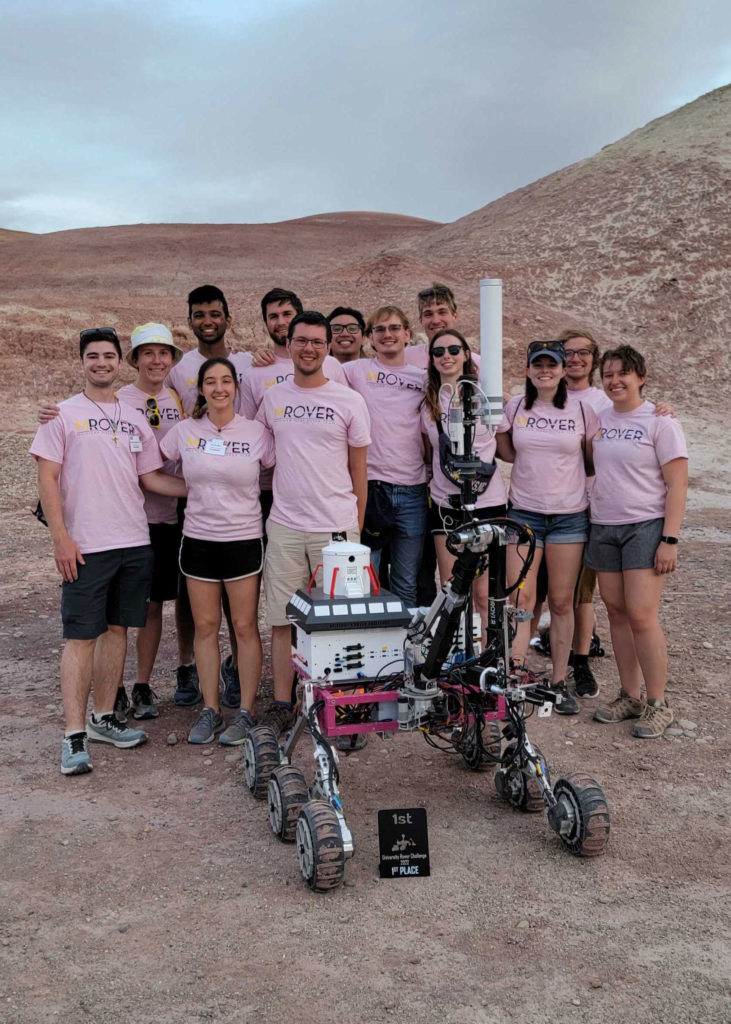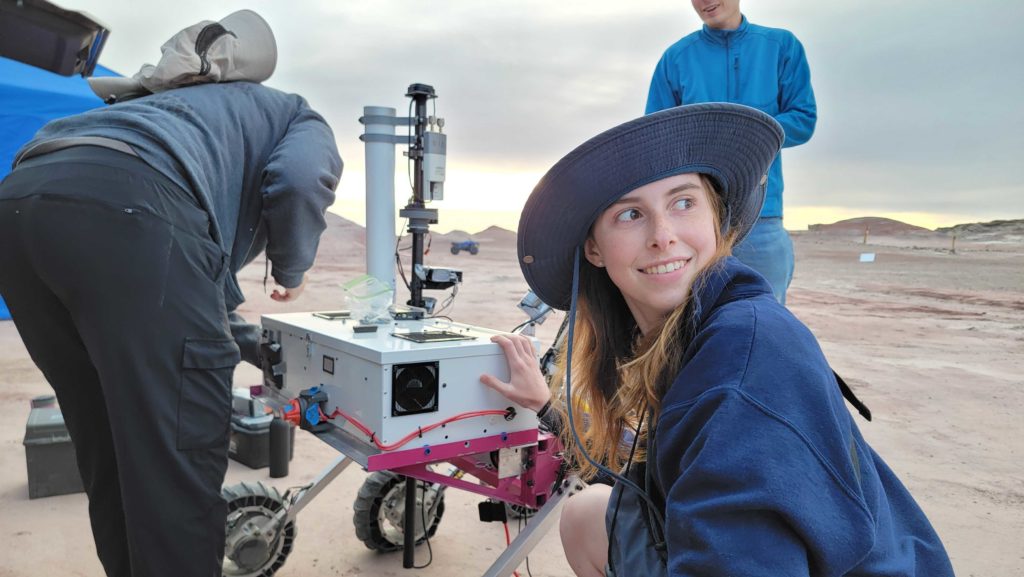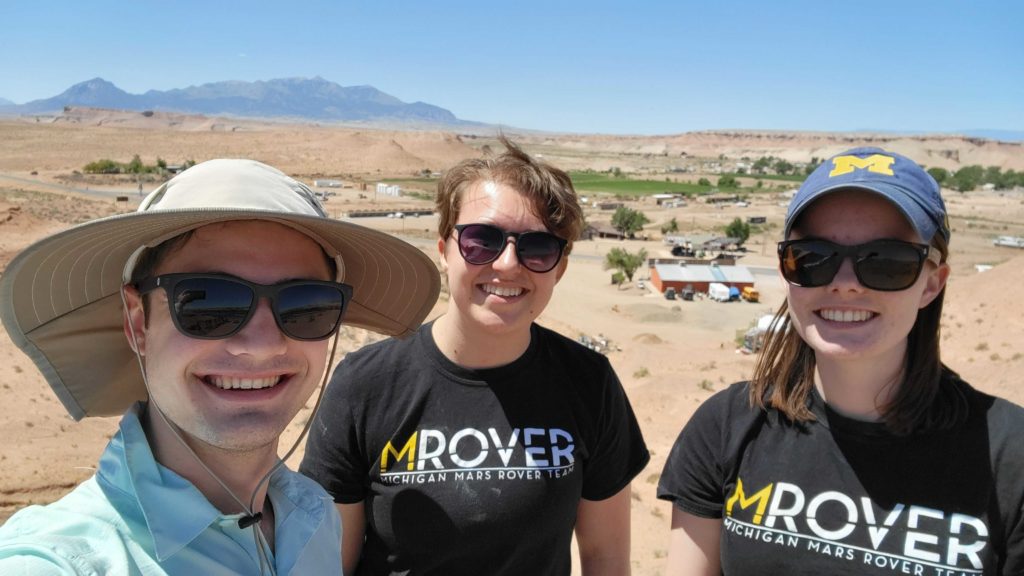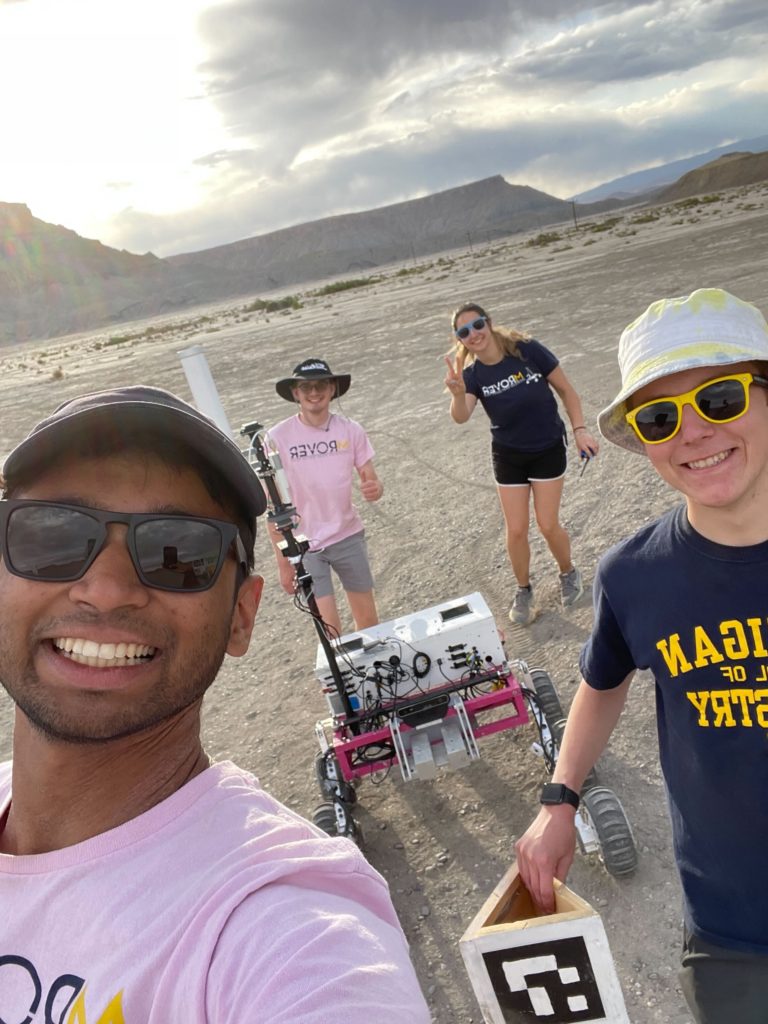
What makes a champion?
MRover participants on their team, their national victory, and building a community

MRover participants on their team, their national victory, and building a community
The University of Michigan Mars Rover (MRover) team competed at the University Rover Challenge in June in Utah at the preeminent international rover competition. They won.
Teams from all over the world gathered to test their robotic design skills in developing the next generation of Mars rovers that will be a part of future space exploration pursuits.
We sat down with a few MRover members to learn a little more about what it takes to build a Rover, a strong team, and win it all.

What was the most challenging part of preparing for the competition?
Jackson: In my opinion, the balance between practicing and perfecting our system is the most difficult. We had to decide between debugging inconvenient issues and prioritizing operator practice. While it was difficult as an engineer to forgo fixing all the bugs that we found, we knew that operator practice would have a more significant impact on our performance in the competition.
What was it like to win??
Abby: It was really amazing to win and it made all the hard work of the past couple of years worth it! This was the first time we’ve been to competition since I have been on the team, and it has been super frustrating to put so much time and effort just for our competition to be canceled. Finally getting to this point and then winning was an awesome experience!
What was the process?

Abby: We design and build a completely new rover every year. Mechanical design starts in the Summer, and is completed in the Fall when manufacturing starts. The rover is completely built and integrated by March. This process is a lot of work within a tight timeline, but we try to create intermediate deadlines to make sure no one gets behind and the work is manageable. It’s a lot of work overall, but seeing the finished rover definitely makes it all worth it!
Talk about your team and how you balance engineering, operations and planning?
Jackson: I think a lot of our success this year came from the amount of preparation and planning we did during the year. We start our design cycle during the summer to start thinking about iterations or modifications that we want to make on our mechanical systems. During the year, we have several deadlines to complete our engineering which allow us to stay on track throughout the year. Most of the subteam leads handle the detailed engineering whereas the branch leads and Chief handle the big picture planning.
What surprised you the most as you prepared and competed this year?
Jackson: Since this is my fully in-person year and first design cycle for MRover, I was most surprised with the amount of iterations that we have to make to ensure that the system works properly. Iterating plays a critical role in engineering and it’s a necessary skill to have in any design process. You need to recognize the problem early on and understand how to fix it. When we come together as a team during design reviews, we are usually able to identify these issues before it’s too late.
What set your team apart from other competitors?

Abby: Something that judges complimented us on was how well we all worked together. We did a lot of mock missions and practice for the competition, which made everything go pretty smoothly during the real thing.
What role do your sponsors play in helping the team?
Abby: Our sponsors are super important to our success. Obviously money is essential to building our rover, but our sponsors are super helpful in other ways as well. From software that we can use for our digital twin, to energy drinks, our sponsors give us the tools to be successful in all aspects of what we do.
How does participating in MRover compliment what you are learning in the classroom?
Abby: For me as a physics major, the things I do on MRover are super different from what I learn in my classes. This is awesome because it gives me skills like CAD and machining that I probably never would have learned otherwise. I’ve really been grateful to this team for giving me learning opportunities in areas that I wouldn’t have otherwise.
Being on MRover has dramatically improved my confidence as an engineer because it allowed me to make essential contributions to a large, multidisciplinary project. To contribute to the team, you need to take ownership of your work which can be scary at first, but as you gain experience, you become more comfortable applying what you learned in class to the world beyond the classroom.
Nick Cahill
What are your summers like when you have a big competition like this? Can you still pursue internships and other summer opportunities?
Abby: We are lucky in that our competition is relatively early in the Summer, so for some people their internships don’t even start until after URC is done. Other people take a week off of their internship so that they can make it to comp, and in general, employers are pretty flexible with allowing us to take the time to make it to URC.
Nick: The other competition we go to, the Canadian International Rover Challenge, takes place in the middle of August so most members who attend it schedule their internships to be complete before it.
What do you do for fun?

Abby: As a team we really try to make sure that on top of the work we do, we also build a strong community and have fun as a team. Something we started to do this year is make pancakes at our general body meetings and give people time to socialize and meet all the other people on the team. We also had fun at competition and took some time to explore the surrounding areas, going on a hike at Capitol Reef national park!
What’s next for MRover?
Abby: Obviously this year has been a huge success for us, not only in competition but also in our community as a team. We are hoping to carry this success into our second competition, the Canadian International Rover Challenge in August, and also into the next year. We want to make improvements to our rover based on what we have learned from our competitions this year. We’re also hoping to continue to have fun as a team, and make sure that this is not just a learning experience for our members but a community they feel they belong in.